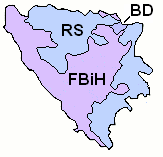Bosnia and Herzegovina is an established federation since 1995. Annex Four of the Dayton Peace Agreement (DPA) marks the constitution of Bosnia and Herzegovina and states in Article 1.3 ‘Bosnia and Herzegovina shall consist of the two Entities, the Federation of Bosnia and Herzegovina and the Republika Srpska.’ [1]
The contradictions in the Bosnian constitution are obvious. First of all, the Bosnian constitution is part of a peace treaty. The Dayton negotiations in November 1995 were first of all peace negotiations between the states of Croatia, Serbia and Bosnia and under the moderation of the USA and the EU. Only in limited ways Dayton marked what William Riker called a “federal bargaining.” [2] Furthermore, the existence of two entities in a country with three main national identities (Bosniaks, Bosnian Serbs and Bosnian Croats) of which one is named “Serb Republic” and the other one is a federation within a federal state, shows not only the complexity of the Dayton constitution but also its over-federalisation and the dominant feature of ethnicity.

If we take Preston King’s distinction between federalism, defined as ‘taken philosophically or ideologically rather than institutionally, most frequently [federalism] appeals for a marked degree of regional independence and autonomy’ [3] and federation, in his definition ‘an institutional arrangement, taking the form of a sovereign state, and distinguished from other states solely by the fact that its central government incorporates regional units into the decision procedure on some constitutionally entrenched basis’ [4] then we can conclude, that the problem of the Bosnian federalism is its negative interpretation by ethnic national groups within Bosnia, while the main problem of the Bosnian federation is the nearly ethnic homogenous territorial division of the country. The Bosnian constitution is dominated by the term “ethnicity” as well as its reference to the “Serbs, Croats and Bosniaks” within Bosnia, while the reference to the “Bosnian citizen” is missing. In addition, the boundaries between the two entities are neither historically nor economically grown ones; instead, they mark the line of the cease fire in the summer of 1995.
Bosnian political parties as the arsonist of continued ethnic nationalism
The Bosnian elections since 1996 have not shown an establishment of a democratic and all- inclusive party system. Instead, nationalist and national parties have won all elections, while moderate parties have only come to power with the massive support of the international community. [5]
While until 2006 the three national parties of the SDA (Party for Democratic Action, Bosniak), the SDS (Serb Democratic Party) and the HDZ (Croat Democratic Union) have dominated the parliaments in Republika Srpska (RS), the Muslim-Croat Federation (FBiH) and the central institutions; the 2006 elections showed a different picture. While in the RS, the SNSD (Independent Social Democrats) under Milorad Dodik won an absolute majority in the RS assembly and also won the seat of the Serb member of the Bosnian Presidency, the Bosniaks voted with a large majority for the Party for Bosnia and Herzegovina SBiH under Haris Silajdzic. Both parties can be seen as rivals who will probably form a coalition in the Bosnian House of Representatives. In addition, for the first time the HDZ does not send one of its party members to the Bosnian Presidency, instead the SDP (Social Democrats) will be represented in the Presidency. For the first time in post-war Bosnia, none of the national parties will send a member to Bosnian presidency. But the hope for change is limited, Dodik and Siajdzic used national rhetoric during the election campaign and their parties refer to one single ethnic group. Only the election of Zeljko Komsic, the SDP member of the Presidency gives a little bit of hope.
The parties have a lot of work to do. Bosnia’s economy is characterised by 40 per cent unemployment, a bad infrastructure and the money of the International Community is rolling back. Furthermore, the in April 2006 failed constitutional reform has not only to be reanimated, but serious talks about a new constitution have to begin. Bosnia needs its “federal bargaining” as soon as possible.
The International Community
Bosnia’s political system after the Dayton accord is highly dominated by international actors. Three out of the nine judges at the constitutional court are appointed by the Council of Europe, until 2002 the OSCE organised the elections in Bosnia and proposed electoral rules and the Office of the High Representative (OHR) as the central institution for the aspects of the civilian implementation of the Dayton accord has become the most import institution in Bosnia’s political system. While Carld Bildt, the first High Representative until 1997 was more or less a “toothless tiger” (Joseph Marko), the Bonn summit of the Peace Implementation Council gave the High Representative extended rights including the right to force Bosnian politicians out of office, and the right of the “imposition” of bills without the direct participation of any Bosnian institution.
Many authors spoke of Bosnia since 1997 as a protectorate while others used the term “moderated democracy.”
Many authors spoke of Bosnia since 1997 as a protectorate while others used the term “moderated democracy.” Either way, in June 2007 the OHR is supposed to close and this will mark the day, when Bosnian politicians are responsible for their country, without the knowledge that they don’t have to find an agreement, because the High Representative can implement law and the politicians do not have to take the responsibility for unpopular policy.
On the other hand, the European Police Mission and the European Military Mission in Bosnia will continue to operate, not any more as a buffer between the enemy armies but as a moderator and mediator in terms of military and police reform.
Furthermore, the European Union will continue its engagement in Bosnia and offers the country a perspective as a future member state. Until then, Bosnian politicians have a lot of work to do. Until this point federalism has been used as a tool to separate national identities, rather than unite them within the borders of Bosnia. In the country’s quest for functioning civil society, overcoming this misinterpretation is one of the biggest steps that must be taken.


Follow the comments: |
|
